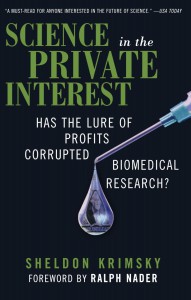
Book Description:
Something has changed in the culture and values of academic science over the last quarter-century. University science is now entangled with entrepreneurship, and researchers with a commercial interest are caught in an ethical quandary. How can an academic scientist honor knowledge for its own sake, while also using knowledge as a means to generate wealth? Science in the Private Interest investigates the trends and effects of modern, commercialized academic science. This book dives unhesitatingly into some of modern science's messiest and most urgent questions. How did scientists begin choosing proprietary gain over the pursuit of knowledge? What effects have academic-corporate partnerships had on the quality and integrity of science? And, most importantly, how does this affect the public?
From The New England Journal of Medicine
The title of this book may scare some readers away. They shouldn't let it. Even as it takes an uncompromising stance on the need for scientific integrity, Science in the Private Interest is carefully researched and presents arguments from all sides of the issues under discussion. Case studies sprinkled throughout the book demonstrate that the main characters — universities, large companies, and some academicians — at times cloak monetary and career-advancing priorities in scientific clothing. Yet most of the pages of the book are not exposes of biomedical wrongdoing but explanations of the laws and regulations that govern how academia and industry interrelate. In Science in the Private Interest, Sheldon Krimsky explores how scientific discoveries made within academic walls can be translated into better lives for members of the general public. Without the profit motive to stimulate private investment in discoveries with potential application to human need, laboratory breakthroughs might be confined to the pages of a prominent or obscure journal. Yet that same profit-oriented motive introduces a new set of priorities, motivations, and cultural norms into university laboratories and academic investigations. One university official is quoted as saying, “The only thing wrong with tainted money is there t'aint enough of it.” Is there a way out of the dilemma? Can corporate funding be made available to translate biomedical advances into beneficial products without allowing the money to distort the purity of scientific inquiry? In an important contribution to scholarly inquiry into university-industry collaboration, Krimsky considers the work of sociologist Robert Merton, who in the 1930s proposed a series of standards by which science should be evaluated. Merton suggested four norms of science. “Universalism” refers to the objective nature of science that transcends national, cultural, or institutional boundaries. “Communalism” stands for public ownership of the fruits of scientific investigation, holding that each scientific advance is built on past discoveries and should not become the private property of a person or institution. Merton's third norm is “disinterestedness,” requiring scientists to perform and to interpret their work “without considerations of personal gain, ideology, or fidelity to any cause other than the pursuit of truth.” Finally, Merton calls on scientists and their institutions to practice “organized skepticism,” suspending final judgment on a discovery until all possible facts are at hand. Krimsky uses these standards to evaluate the state of scientific inquiry in the current era of growing private funding of universities and heightened corporate influence over academic behavior. He struggles with the applicability of Mertonian norms to modern reality. For example, is communalism (public access to scientific knowledge) an absolute yardstick of scientific integrity, given that industry has a reasonable right to patent products (a process requiring secrecy) that its funds help to develop? What kinds of discoveries merit the overriding of communalism? Is it proper to patent objects that already exist in nature, such as genes? Or should knowledge be treated as private property only for such inventions as the vacuum cleaner and the hepatitis B vaccine? This book is worthwhile reading for anyone interested in biomedical innovation. Thomas Bodenheimer, M.D.
Phi Beta Iota: The loss of integrity across all eight tribes of knowledge (academia, civil society including labor and religions, commerce, government, law enforcement, media, military, and non-governmental/non-profit) has been quite severe. The truth at any cost lowers all others costs — at this time the financial concentration of wealth has disemboweled all other sources of power to the detriment of human prosperity and peace.
See Also:
Robert Steele: Itemization of Information Pathologies



